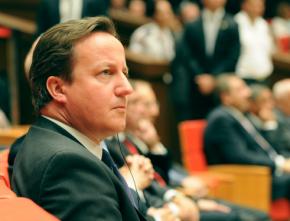A new speed record for broken promises
Independent columnist documents a new low for political duplicity, with the Tories, Liberal Democrats and Labour all abandoning their pledges to Scotland.
EVEN BY the standards of political leaders, the speed and scale of the broken promise about Scotland has been glorious. Two days after signing a "vow" to hand over "extensive new powers," Prime Minister David Cameron announced he would indeed act swiftly to ensure Scottish MPs had less power.
You couldn't help applaud, like if the groom at a wedding reception began his speech by saying: "You all heard me make those vows of lifelong partnership to my wife a few hours ago. That's why I can declare I've already given the bridesmaid one in the graveyard behind the church, a task I was committed to seeing through and will carry out again and again until I am fully satisfied. Now are there any questions?"
Cameron, along with Nick Clegg of the Liberal Democrats and Ed Miliband of the Labour Party, didn't just promise. They might have made do with a pledge, but Clegg had already ruined the meaning of a pledge. With his record of doing the exact opposite of what he's pledged, by now, he'd have abolished Scotland altogether, or reclassified it as a species of insect.

So they made a "solemn vow," the sort made to God by monks in the 7th century--and now that's worthless as well, so next time, they'll have to raise it to a sacrifice. Before the election, David Cameron will kneel before an altar and chop a goat in half, and then, as he smears its blood on his face, he'll say, "I will raise the minimum tax threshold," before talking in tongues and fainting.
Because where a few weeks ago, the party leaders were making speeches such as "Scotland, Scotland, Scotland, together we fought evil and invented fish and created the sun, oh beloved Scotland, we are bound by the heavens, I would gladly have my buttocks sculpted to resemble the mountains of Glen Coe to secure our togetherness," now they don't even mention Scotland in a debate about Scotland.
Many MPs, including Alistair Darling, didn't turn up for it, and the debate in parliament was all about which votes to exclude Scottish MPs from. Gordon Brown begged the Conservatives to think about introducing the measures they'd got him to absolutely guarantee they were absolutely introducing, to which they replied: "Oh shut up, going on about Scotland. It's typical of the unfairness that this Scotland debate has only once mentioned Hemel Hempstead."
THE MAIN part of any new law will be to ensure Scottish MPs can't vote on English matters because, as some English MPs say: "This unfair situation makes many people angry."
You can see why it has to be dealt with if it's making many people angry. There aren't enough anger management therapists around to deal with the anxiety of so many people punching trees in rage and climbing to the tops of gas works to yell: "Why, why, why can a law, in theory, that alters, say, building regulations in my area be voted on by some bastard from Stenhousemuir when my MP can't vote on building regulations there. Aye? Why, Why, Why?"
All of us who live in England know the heartache of begging our MP to vote about the proposed ring road in Stranraer, just for them to clasp our hand and tearfully tell us they have no say.
Maybe they'll ease the concerns by making another vow, to give Scotland even more extensive powers, and then take a bit more away. Then they can keep doing this until Scotland is owned by a Saxon warlord, and Glasgow has to provide 200 knights a month to fight the Normans.
William Hague has assured the Scottish National Party the timetable for the vow is still on schedule, but it seems likely there'll be an imaginative definition of "extensive new powers." Most likely is that they will be:
a) Falkirk gets mentioned on the BBC weather map every Tuesday; and
b) Water from English seas will be allowed to flow past Scotland, if the tide's heading that way.
And in return, Scottish MPs will only be allowed to vote on issues relating to shortbread.
Whatever you think about Scottish independence, this system of doing the opposite of what is pledged or vowed appears to be the rule now. Over the next few months, party leaders will film themselves with their parents, and say, "I super-vow, on their souls, that I will never raise the value-added tax and will hand them to the devil personally if I so much as consider putting it up." Then a year later, they'll say they have to be realistic and need to put it up to help hardworking families, and make their mum minister of VAT and the Devil chief secretary to the Treasury.
The Liberal Democrats combine this technique with a surly sorry, that appears as heartfelt as when a teenager breaks a promise about vacuuming the living room. So whenever the issue is raised of how they tripled the tuition fees they pledged to abolish, they say: "Oh for God's sake, I said sorry, didn't I? I'll say it again, shall I? Sorry! There. Happy now?"
Then the party leaders puzzle as to why their support slips away to a new bunch of parties.
Maybe one way they can reverse this is to try a more forthright approach. To start with they could say: "If the Scottish are so daft as to believe our vow, maybe that proves they're not fit to run their own country anyway, the idiots."
First published at the Independent.


